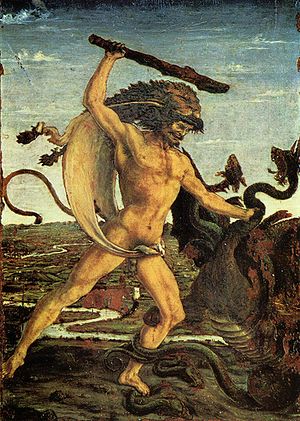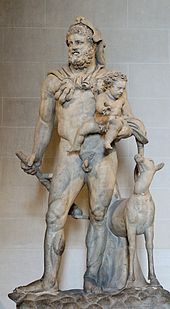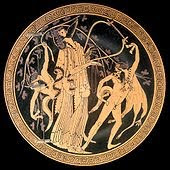nedjelja, 16. siječnja 2011.
ANDAUTONIA (near Zagreb, Croatia)
Our main goal is to present our cultural heritage throughout the world and in this try to connect people worldwide to interact with eachother and make interesting projects possible.
Please comment and feel free to make a suggestion and so on. ENJOY!
četvrtak, 13. siječnja 2011.
Other stories from the Trojan War


Other stories from the Trojan War
When the Achaean ships reached the beach of Troy, no one would jump ashore, since there was an oracle that the first Achaean to jump on Trojan soil would die. Odysseus tossed his shield on the shore and jumped on his shield. He was followed by Protesilaus, who jumped on Trojan soil and later became the first to die. Odysseus never forgave Palamedes for unmasking his feigned madness, leading him to frame him as a traitor.
At one point, Odysseus convinced a Trojan captive to write a letter pretending to be from Palamedes. A sum of gold was mentioned to have been sent as a reward for Palamedes's treachery. Odysseus then killed the prisoner and hid the gold in Palamedes's tent. He ensured that the letter was found and acquired by Agamemnon, and also gave hints directing the Argives to the gold.
 This was evidence enough for the Greeks and they had Palamedes stoned to death. Other sources say that Odysseus and Diomedes goaded Palamedes into descending a wall with the prospect of treasure being at the bottom. When Palamedes reached the bottom, the two proceeded to bury him with stones, killing him.
This was evidence enough for the Greeks and they had Palamedes stoned to death. Other sources say that Odysseus and Diomedes goaded Palamedes into descending a wall with the prospect of treasure being at the bottom. When Palamedes reached the bottom, the two proceeded to bury him with stones, killing him.When Achilles was slain in battle, it was Odysseus and Telamonian Ajax who successfully retrieved the fallen warrior's body and armour in the thick of heavy fighting. During the funeral games for Achilles, Odysseus competed once again with Telamonian Ajax. Thetis said that the arms of Achilles would go to the bravest of the Greeks, but only these two warriors dared lay claim to that title. The two Argives became embroiled in a heavy dispute about one another's merits to receive the reward.
The Greeks dithered out of fear in deciding a winner, because they did not want to insult one and have him abandon the war effort. Nestor suggested that they allow the captive Trojans decide the winner. Some accounts disagree, suggesting that the Greeks themselves held a secret vote. In any case, Odysseus was the winner. Enraged and humiliated, Ajax was driven mad by Athena. When he returned to his senses, in shame at how he had slaughtered livestock in his madness, Ajax killed himself by the sword that Hector had given him. Together with Diomedes, Odysseus went to fetch Achilles' son, Pyrrhus, to come to the aid of the Achaeans, because an oracle had stated that Troy could not be taken without him.
A great warrior, Pyrrhus was also called Neoptolemus (Greek: "new warrior"). Upon the success of the mission, Odysseus gave Achilles' armor to him. It was later learned that the war could not be won without the poisonous arrows of Heracles, which were owned by the abandoned Philoctetes.

Odysseus and Diomedes (or, according to some accounts, Odysseus and Neoptolemus) went out to retrieve them. Upon their arrival, Philoctetes (still suffering from the wound) was seen still to be enraged at the Danaans, especially Odysseus, for abandoning him. Although his first instinct was to shoot Odysseus, his anger was eventually diffused by Odysseus's persuasive powers and the influence of the gods. Odysseus returned to the Argive camp with Philoctetes and his arrows. Odysseus and Diomedes would later steal the Palladium that lay within Troy's walls, for the Greeks were told they could not sack the city without it. Some sources indicate that Odysseus schemed to kill his partner on the way back, but Diomedes thwarted this attempt. Perhaps Odysseus' most famous contribution to the Greek war effort was devising the strategem of the Trojan Horse, which allowed the Greek army to sneak into Troy under cover of darkness. It was built by Epeius and filled with Greek warriors, led by Odysseus.
After Troy was sacked, Odysseus threw Hector's son Astyanax from the city walls to his death, lest the child reach manhood and avenge his father.



petak, 7. siječnja 2011.
Odysseus


Odysseus (Greek: Ὀδυσσεύς, Odusseus) or Ulysses (Latin: Ulyssēs, Ulixēs) was a legendary Greek king of Ithaca and the hero of Homer's epic poem the Odyssey.
Odysseus also plays a key role in Homer's Iliad and other works in the Epic Cycle. King of Ithaca, husband of Penelope, father of Telemachus, and son of Laërtes and Anticlea, Odysseus is renowned for his guile and resourcefulness, and is hence known by the epithet Odysseus the Cunning (mētis, or "cunning intelligence"). He is most famous for the ten eventful years he took to return home after the ten-year Trojan War and his famous Trojan Horse trick.
"Cruel Odysseus"
Homer's Iliad and Odyssey portrayed Odysseus as a culture hero, but the Romans, who believed themselves the scions of Prince Aeneas of Troy, considered him a villainous falsifier. In Virgil's Aeneid, he is constantly referred to as "cruel Odysseus" (Latin "dirus Ulixes") or "deceitful Odysseus" ("pellacis", "fandi fictor").
Turnus, in Aeneid ix, reproaches the Trojan Ascanius with images of rugged, forthright Latin virtues, declaring (in John Dryden's translation), "You shall not find the sons of Atreus here, nor need the frauds of sly Ulysses fear." While the Greeks admired his cunning and deceit, these qualities did not recommend themselves to the Romans who possessed a rigid sense of honour. In Euripides's tragedy Iphigenia at Aulis, having convinced Agamemnon to consent to the sacrifice of his daughter, Iphigenia, to appease the goddess Artemis, Odysseus facilitates the immolation by telling her mother, Clytemnestra, that the girl is to be wed to Achilles. His attempts to avoid his sacred oath to defend Menelaus and Helen offended Roman notions of duty; the many stratagems and tricks that he employed to get his way offended Roman notions of honour.
Before the Trojan War
The majority of sources for Odysseus' antebellum exploits—principally the mythographers Apollodorus and Hyginus—postdate Homer by many centuries.
Two stories in particular are well known: When Helen was abducted, Menelaus called upon the other suitors to honour their oaths and help him to retrieve her, an attempt that would lead to the Trojan War. Odysseus tried to avoid it by feigning lunacy, as an oracle had prophesied a long-delayed return home for him if he went. He hooked a donkey and an ox to his plough (as they have different stride lengths, hindering the efficiency of the plough) and (some modern sources add) started sowing his fields with salt.
Palamedes, at the behest of Menelaus's brother Agamemnon, sought to disprove Odysseus's madness, and placed Telemachus, Odysseus's infant son, in front of the plough. Odysseus veered the plough away from his son, thus exposing his stratagem. Odysseus held a grudge against Palamedes during the war for dragging him away from his home. Odysseus and other envoys of Agamemnon then traveled to Scyros to recruit Achilles because of a prophecy that Troy could not be taken without him.
By most accounts, Thetis, Achilles's mother, disguised the youth as a woman to hide him from the recruiters because an oracle had predicted that Achilles would either live a long, uneventful life or achieve everlasting glory while dying young. Odysseus cleverly discovered which of the women before him was Achilles when the youth stepped forward to examine an array of weapons. Odysseus arranged for the sounding of a battle horn, which prompted Achilles to clutch a weapon; with his disguise foiled, he joined Agamemnon's army.
During the Trojan War
The Iliad
Odysseus was one of the most influential Greek champions during the Trojan War. Along with Nestor and Idomeneus he was one of the most trusted counsellors and advisers. He always championed the Achaean cause, especially when the king was in question, as in one instance when Thersites spoke against him.
When Agamemnon, to test the morale of the Achaeans, announced his intentions to depart Troy, Odysseus restored order to the Greek camp. Later on, after many of the heroes had left the battlefield due to injuries (including Odysseus and Agamemnon), Odysseus once again persuaded Agamemnon not to withdraw. Along with two other envoys, he was chosen in the failed embassy to try to persuade Achilles to return to combat.
When Hector proposed a single combat duel, Odysseus was one of the Danaans who reluctantly volunteered to battle him. Telamonian Ajax, however, was the volunteer who eventually did fight Hector. Odysseus aided Diomedes during the successful night operations in order to kill Rhesus, because it had been foretold that if his horses drank from the Scamander river Troy could not be taken.
After Patroclus had been slain, it was Odysseus who counselled Achilles to let the Achaean men eat and rest rather than follow his rage-driven desire to go back on the offensive—and kill Trojans—immediately. Eventually (and reluctantly), he consented. During the funeral games for Patroclus, Odysseus became involved in a wrestling match with Telamonian Ajax, as well as a foot race. With the help of the goddess Athena, who favoured him, and despite Apollo's helping another of the competitors, he won the race and managed to draw the wrestling match, to the surprise of all. Odysseus has traditionally been viewed in the Iliad as Achilles's antithesis: while Achilles's anger is all-consuming and of a self-destructive nature, Odysseus is frequently viewed as a man of the mean, renowned for his self-restraint and diplomatic skills. He is more conventionally viewed as the antithesis of Telamonian Ajax (Shakespeare's "beef-witted" Ajax) because the latter has only brawn to recommend him, while Odysseus is not only ingenious (as evidenced by his idea for the Trojan Horse), but an eloquent speaker, a skill perhaps best demonstrated in the embassy to Achilles in book 9 of the Iliad. And the pair are not only foils in the abstract but often opposed in practice; they have many duels and run-ins.
četvrtak, 6. siječnja 2011.
Twelve Labors of Hercules or Dodekathlos
The Twelve Labors of Hercules or Dodekathlos (Greek: δωδέκαθλον, dodekathlon) are a series of archaic episodes connected by a later continuous narrative, concerning a penance carried out by Heracles, the greatest of the Greek heroes, whose name was later romanised as Hercules. The establishment of a fixed cycle of twelve labours was attributed by the Greeks to an epic poem, now lost, written by Peisander, dated about 600 BC (Burkert).
Driven mad by Hera, Heracles slew his own children. To expiate the crime, Heracles was required to carry out twelve labors set by his archenemy, Eurystheus, who had become king in Heracles' place. If he succeeded, he would be purified of his sin and, as myth says, he would be granted immortality. Heracles accomplished these tasks, but Eurystheus did not accept the cleansing of the Augean stables because Heracles was going to accept pay for the labor. Neither did he accept the killing of the Lernaean Hydra as Heracles' nephew and charioteer, Iolaus, had helped him burn the stumps of the heads. Eurystheus set two more tasks (fetching the Golden Apples of Hesperides and capturing Cerberus), which Heracles performed successfully, bringing the total number of tasks up to twelve.
The labours
As they survive, the Labours of Heracles are not told in any single place, but must be reassembled from many sources. Ruck and Staples assert that there is no one way to interpret the labours, but that six were located in the Peloponnese, culminating with the rededication of Olympia. Six others took the hero farther afield. In each case, the pattern was the same: Heracles was sent to kill or subdue, or to fetch back for Hera's representative Eurystheus a magical animal or plant. "The sites selected were all previously strongholds of Hera or the 'Goddess' and were Entrances to the Netherworld".
A famous depiction of the labours in Greek sculpture is found on the metopes of the Temple of Zeus at Olympia, which date to the 450s BC.
In his labours, Heracles was sometimes accompanied by a male companion (an eromenos), according to Licymnius and others, such as Iolaus, his nephew. Although he was only supposed to perform ten labours, this assistance led to him suffering two more. Eurystheus didn't count the Hydra, because Iolaus helped him, or the Augean stables, as he received payment for his work, or because the rivers did the work.
A traditional order of the labours found in Apollodorus is:
- Slay the Nemean Lion.
- Slay the nine-headed Lernaean Hydra.
- Capture the Golden Hind of Artemis.
- Capture the Erymanthian Boar.
- Clean the Augean stables in a single day.
- Slay the Stymphalian Birds.
- Capture the Cretan Bull.
- Steal the Mares of Diomedes.
- Obtain the girdle of Hippolyta, Queen of the Amazons.
- Obtain the cattle of the monster Geryon.
- Steal the apples of the Hesperides.
- Capture and bring back Cerberus.
As a reward for finishing these twelve treacherous tasks, he was given the gift of immortality after his death by Zeus, his father. Hera forgave him and gave him her daughter Hebe for his bride.
subota, 1. siječnja 2011.
Heracles and the Heracleidae
Some scholars believe that behind Heracles' complicated mythology there was probably a real man, perhaps a chieftain-vassal of the kingdom of Argos. Some scholars suggest the story of Heracles is an allegory for the sun's yearly passage through the twelve constellations of the zodiac. Others point to earlier myths from other cultures, showing the story of Heracles as a local adaptation of hero myths already well established.
Traditionally, Heracles was the son of Zeus and Alcmene, granddaughter of Perseus. His fantastic solitary exploits, with their many folk-tale themes, provided much material for popular legend. He is portrayed as a sacrificier, mentioned as a founder of altars, and imagined as a voracious eater himself; it is in this role that he appears in comedy, while his tragic end provided much material for tragedy — Heracles is regarded by Thalia Papadopoulou as "a play of great significance in examination of other Euripidean dramas".
In art and literature Heracles was represented as an enormously strong man of moderate height; his characteristic weapon was the bow but frequently also the club. Vase paintings demonstrate the unparalleled popularity of Heracles, his fight with the lion being depicted many hundreds of times. Heracles also entered Etruscan and Roman mythology and cult, and the exclamation "mehercule" became as familiar to the Romans as "Herakleis" was to the Greeks. In Italy he was worshipped as a god of merchants and traders, although others also prayed to him for his characteristic gifts of good luck or rescue from danger.
Heracles attained the highest social prestige through his appointment as official ancestor of the Dorian kings. This probably served as a legitimation for the Dorian migrations into the Peloponnese. Hyllus, the eponymous hero of one Dorian phyle, became the son of Heracles and one of the Heracleidae or Heraclids (the numerous descendants of Heracles, especially the descendants of Hyllus — other Heracleidae included Macaria, Lamos, Manto, Bianor, Tlepolemus, and Telephus). These Heraclids conquered the Peloponnesian kingdoms of Mycenae, Sparta and Argos, claiming, according to legend, a right to rule them through their ancestor. Their rise to dominance is frequently called the "Dorian invasion".
The Lydian and later the Macedonian kings, as rulers of the same rank, also became Heracleidae. Other members of this earliest generation of heroes, such as Perseus, Deucalion, Theseus and Bellerophon, have many traits in common with Heracles. Like him, their exploits are solitary, fantastic and border on fairy tale, as they slay monsters such as the Chimera and Medusa. Bellerophon's adventures are commonplace types, similar to the adventures of Heracles and Theseus. Sending a hero to his presumed death is also a recurrent theme of this early heroic tradition, used in the cases of Perseus and Bellerophon.



